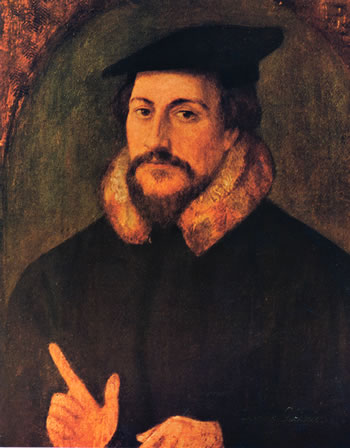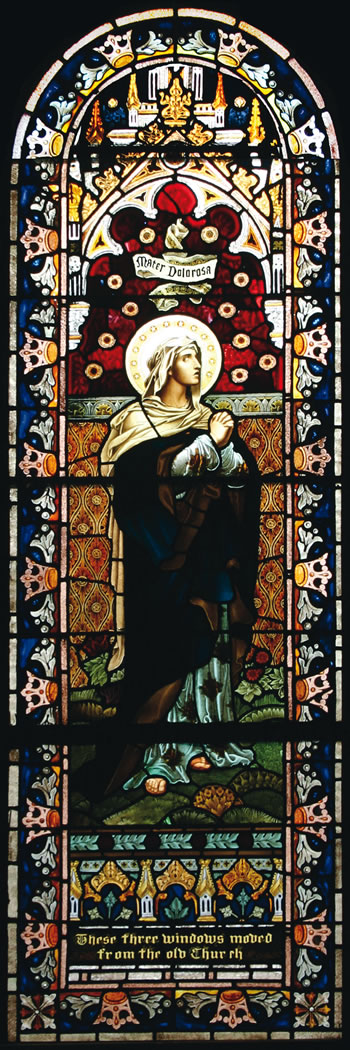Mary and the Reformation (6)

Br Kieran Fenn FMS
John Calvin
(1509 - 1564) Part 1
A mixed perspective

John Calvin, Anonymous, c. 1550
This French reformer differed from Zwingli and Luther. Coming later (1509-1564), as part of the second wave of the Reformation, and being more distant from medieval forms of piety, Calvin did not share the popular Marian devotion of earlier days. It is sometimes said that Calvin had no Mariology, but this is an error. The commentaries he wrote on Scripture did not avoid reflecting on the Virgin Mary and her place in relation to Christ and Church. He preached on the infancy gospels and the nativity of Jesus, and referred to Mary in other sermons. Yet he had much to say against Catholic doctrines and devotional practices, including those focussed on Mary and the saints.
Begin with the husband
Like Zwingli and even more so, Calvin paid close attention to Joseph, the man whom Mary was to marry, ‘a poor carpenter, and yet of the royal line from which came the Redeemer of the world;’ that he was ‘a just man,’ and in obedience to the Law would believe that Mary deserved death when he discovered her pregnancy. Yet he did not wish to speak evil of her, and ‘he hated the idea that this poor girl would die because of his report on her.’ To free himself from the duty of reporting her, he decided to break the promise of marriage and disappear from her life.
Calvin was aware that some followers of the Reformation claimed that Mary had children from Joseph after the birth of her first-born, but called this perspective following the ancient heresy of Helvidius, and speculation beyond the testimony of the Scriptures. Joseph, said Calvin, ‘stayed in the service of God, submitting fully, rather than doing what would be more to his liking.’
The Annunciation
In 1555 Calvin wrote, in a commentary on the Synoptic Gospels, of the Virgin in the context of the annunciation. From this episode, he drew a lesson in humility. The angel says to this girl, ‘Hail, you who have followed grace.’ The grace does not belong to Mary but to God. What the angel acknowledges is her faith and fidelity, not her merits. In reality she has no merits of her own. All that she has is from God: ‘If Mary’s blessedness, justice, and life flow from God’s gratuitous love, her virtues and all her excellence are merely God’s liberality.’ Mary is ‘agreeable,’ pleasing to God, because God has chosen her. Calvin is quite correct in seeing that ‘Hail Mary, full of grace’ is correctly translated as ‘Hail Mary, filled with grace,’ by God’s action.
Mary’s song

Mater Dolorosa
(Our Lady of Sorrows)
Window in St Mary's, Concord, Sydney
The highlight of Mary’s visit and care for her cousin is her song of thanksgiving, the Magnificat. It is rich in teaching for Calvin. It is in three sections. ‘First, with solemn thanksgiving, she celebrates the mercy of God that she has experienced in herself. Then she commends God’s power and judgments with particular praises. Finally, she brings them down to the present case, in which she explains the redemption formerly promised to the Church and now made effective.’
The first part (Luke vv.46-49a) expresses the Virgin’s profound joy. The faithful should rejoice: ‘God’s fatherly grace is the only one, and salvation flows from it, both filling us with joy.’ From the second part (vv.49b-53) it follows that ‘the praises of Mary in which God’s power and gratuitous favour are not solidly extolled are preposterous and adulterous.’ The third part (vv.54-55) places the accent on the incarnation: ‘Mary shows the divine power at work in the present circumstances of the coming of God’s Son and Servant. Mary affirms that the divine promises that were made to ‘Adam and Noah and others’ will be fulfilled in all Abraham’s descendants in faith.
Mary’s graces
The positive aspects of Calvin’s Mariology emerge in the comments on Mary’s prayer. In her song, the Virgin Mother of Jesus does not, like hypocrites, extol her own virtues and affirm her humility, for true humility does not blow its own trumpet. She confesses her lowly estate and nothingness before God. By the same token, she proclaims the supreme authority and glory of her Creator and Saviour. Likewise, the ‘blessedness’ that, as she prophesies, all generations will proclaim of her, does not belong to her. It belongs to God because it is the grace of God. As she sings of God rather than of herself, Mary becomes our teacher. She should be listened to, learned from, and imitated.
Source: Tavard, George H, 1996, The Thousand Faces of Mary, Michael Glazier
 Entries(RSS)
Entries(RSS)